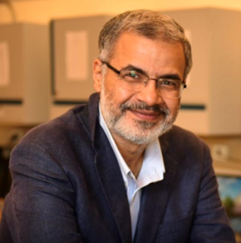Tutorial Speech 1
Tutorial on Quantum Computing for Indoor Positioning and Navigation
Prof. Moustafa Youssef, American University in Cairo

Abstract: Quantum computing is an emerging field at the intersection of computer science, quantum mechanics, and mathematics. It offers a novel approach to problem-solving, enabling efficient solutions for problems that are intractable on classical computers. With researchers globally demonstrating quantum supremacy and the increasing availability of cloud-based quantum computers, quantum computing is transitioning from theory to practical reality.
This tutorial aims to delve into the applications of quantum computing for indoor positioning and navigation problems. The tutorial is structured into three parts. Part 1 will provide an essential background on quantum computing concepts and algorithms, laying the foundational knowledge required for understanding the following parts. Part 2 will present specific examples of how quantum computing can be utilized to solve location tracking problems, highlighting algorithms for both general-purpose quantum processors and quantum annealing machines. Part 3 will discuss the various software and hardware research challenges and opportunities, offering insights into the potential for further exploration and development in this exciting new domain.
Participants will gain a thorough understanding of the principles of quantum computing and its practical applications in indoor positioning and navigation. They will also be introduced to the current state of research, tools, and platforms available for developing quantum computing solutions. This tutorial is designed for researchers, practitioners, and enthusiasts who are interested in exploring the cutting-edge advancements and future prospects of quantum computing in solving complex real-world problems.
Biography:Moustafa Youssef is a professor at the American University in Cairo. His research interests include mobile wireless networks, mobile and pervasive computing, location determination technologies, and quantum computing. He is an Associate Editor for ACM TSAS and the IEEE TMC, served as the Lead Guest Editor of the IEEE Computer Special Issue on Transformative Technologies and an Area Editor of ACM MC2R as well as on the organizing and technical committees of numerous prestigious conferences. He is the recipient of the 2003 University of Maryland Invention of the Year award, the 2010 TWAS-AAS-Microsoft Award for Young Scientists, the 2013 and 2015 COMESA Innovation Award, the 2013 ACM SIGSpatial GIS Conference Best Paper Award, the 2017 Egyptian State Award, multiple Google Research Awards, among many others. He is also an AAS, IEEE, and ACM Fellow.
